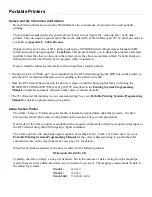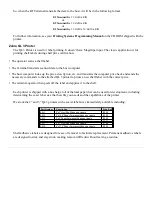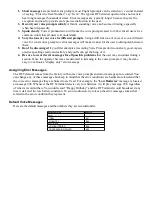
Adding Relays
Connecting a Relay Station
How it works…
A Relay station allows you to extend the area of your RF coverage. Relays are connected by cable to the
Base station, acting as a remote antenna. More than one Relay can be added by “multi-dropping” additional
Relays. Using a Relay requires changing the setup on the Base station in addition to added cabling. The
diagram below shows how Relays are added:
Although Relays will extend your RF range, they do slightly slow down your response time. If response
time is your problem, Relays may help
only
if the problem occurs on the
outer limits
of your range. Use
Site
Testing
to help you determine if adding a Relay will help. If you are considering Relays, read
Chapter 4;
Performance Issues
first.
If adding only one Relay, the cabling should run between the “Relay” port on the Base station and the
“Relay” port on the Relay. In this example, both the Base Station and Relay should have jumpers set to
“terminated”.
To add additional Relays, you must “multi-drop” them off a single bus line running from the “Relay” port on the
Base station. See the section below for cabling requirements and pin-outs. It is very important to follow the pin-
out directions carefully and to use the suggested cable type. The majority of problems we see are the result of
incorrect wiring.
Each Relay requires it’s own power supply. There is no serial parameter setup required on a Relay as it is
transmitting only to the Base station and not directly to a serial port.
Summary of Contents for 7000 Series
Page 1: ......
















































